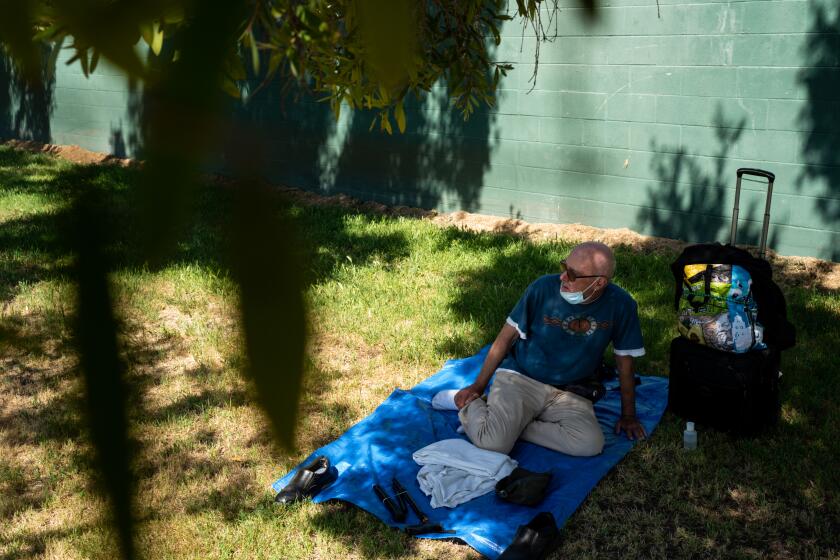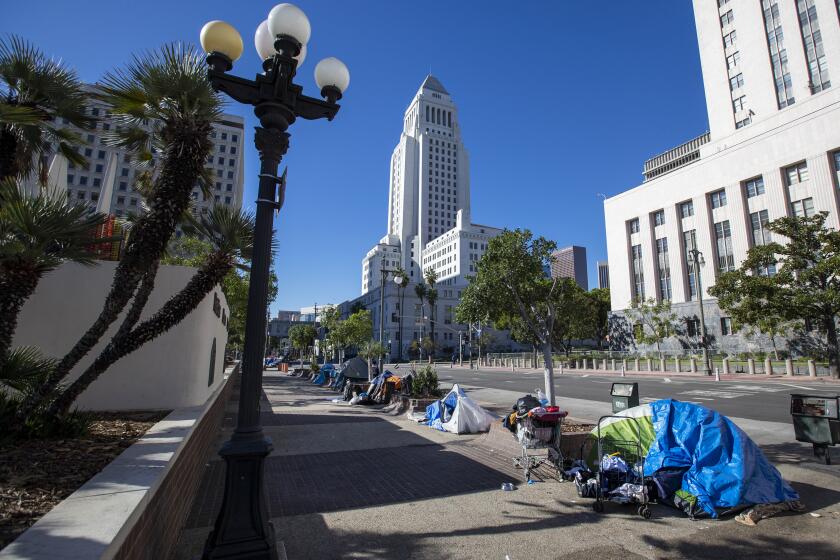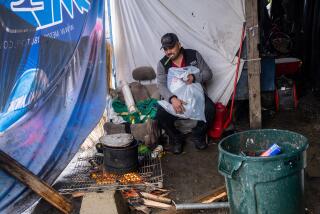‘Manna from heaven’: L.A. officials say Biden funding could get thousands of homeless off streets
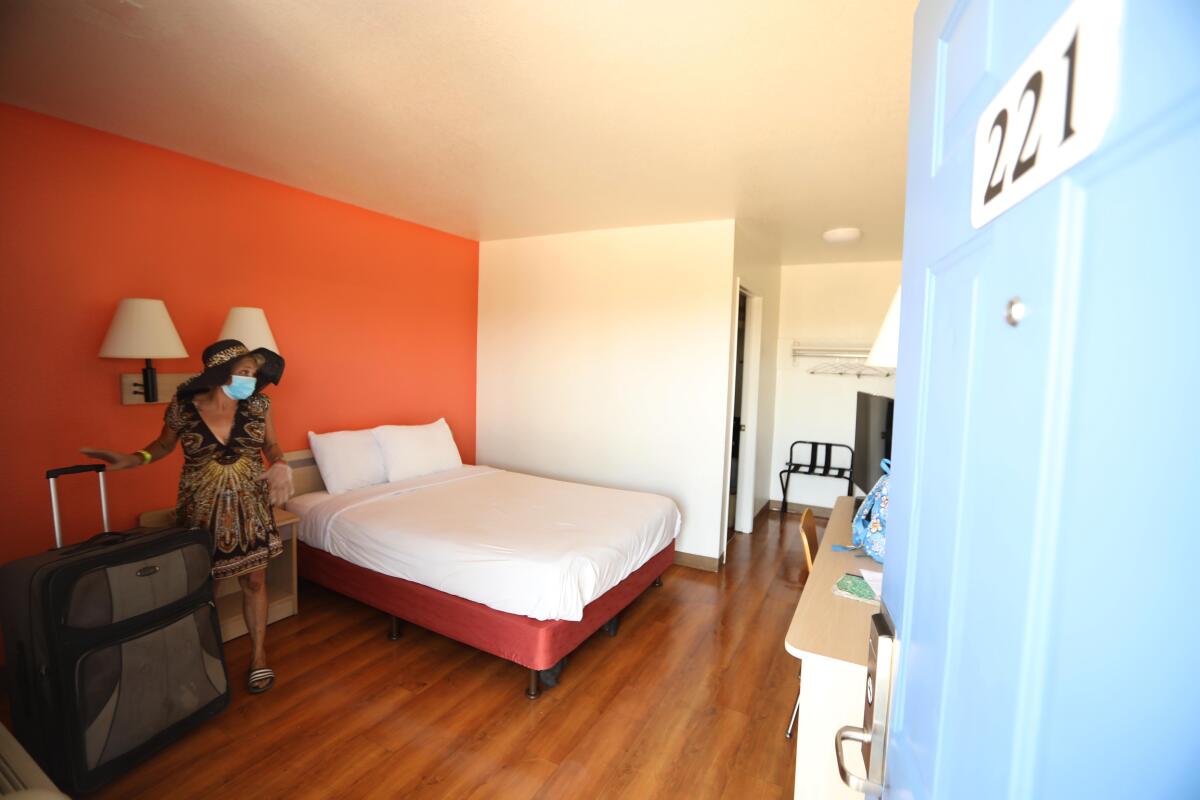
- Share via
An executive order signed by President Biden last week changed federal funding rules in a way that could potentially lift thousands of homeless Angelenos off the streets as the coronavirus continues to rage.
Local elected officials hope a shift in how the Federal Emergency Management Agency reimburses municipalities will breathe new life into an effort to rent hotel rooms for homeless people who are vulnerable to the virus and struggle to isolate.
“This is a huge opportunity. This is like manna from heaven,” said Councilman Mike Bonin, who on Tuesday introduced a motion asking the city to explore options for renting more hotel rooms. He thinks the city should be thinking of renting thousands or tens of thousands of rooms.
“[The federal government] is saying, ‘Here’s a way that we will pay for you to help get people off the streets.’”
Bonin and others’ excitement stems from how FEMA reimburses cities and counties for renting rooms. Under former President Trump, Los Angeles paid for each room and then expected to receive 75% of that money back. Last week, Biden signed an executive order saying that FEMA should reimburse municipalities 100% of what they spend to house people in non-congregate shelters until the end of September.
When the pandemic broke out last year, officials from the city and county scrambled to rent hotels for 15,000 homeless people who had been identified by the Los Angeles Homeless Services Authority as being especially vulnerable because of their age or preexisting medical conditions. The effort came under the aegis of Project Roomkey, a statewide program to house people during the pandemic.
They never got more than 3,774 rooms leased and 4,329 people indoors at one time.
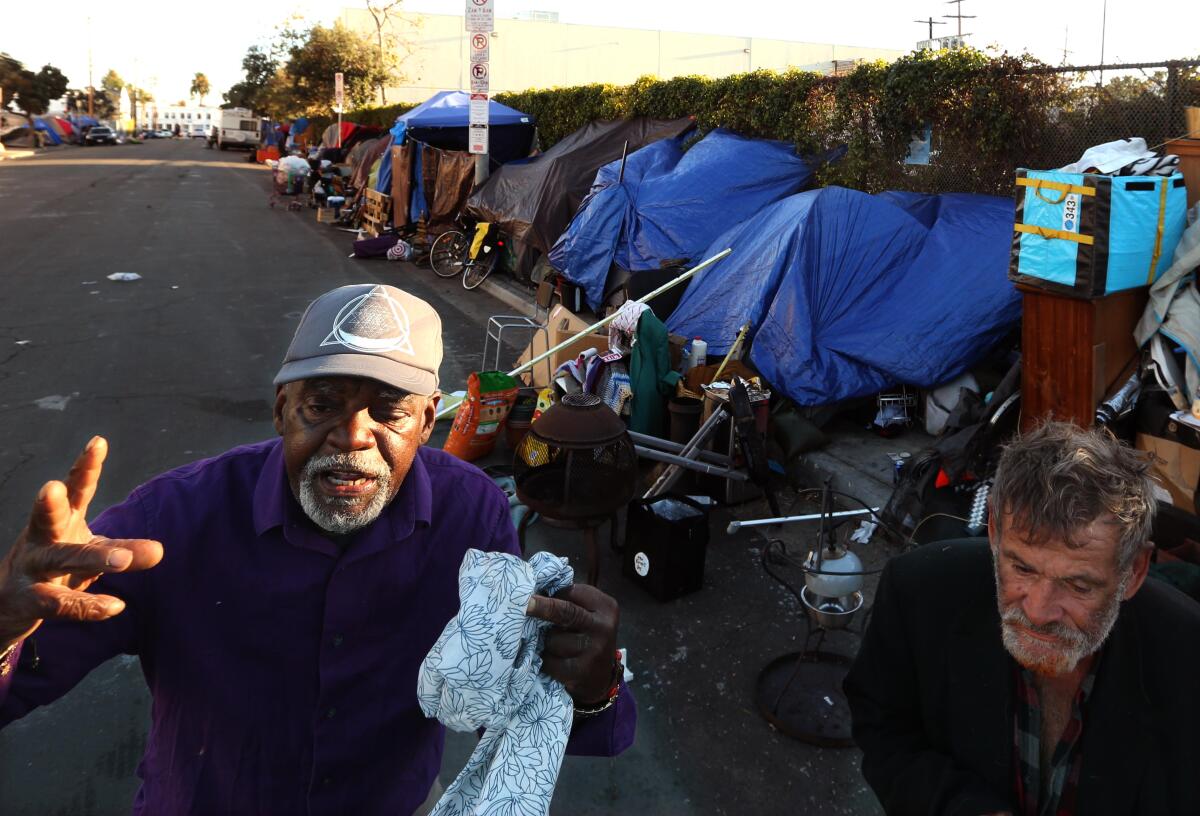
That peak number of beds, which was reached in August, represented a vivid demonstration of what could be done when government acted decisively.
Still, it fell far short of the goal, and since then. the number of available beds has dwindled to just over 2,000 even as more Angelenos have come down with COVID-19 and huge outbreaks have occurred in shelters where homeless people are packed together closely.
The number of new confirmed cases among homeless people has begun to slow from its peak earlier this month. There have been a total of 6,141 confirmed cases in that population since the beginning of the pandemic. .
More than a half a dozen local elected officials told The Times that they want to expand the number of hotels being rented for homeless people.
“Master leasing hotels and motels through Project Roomkey has been one of the most effective tools we have had to combat homelessness and if this new FEMA funding means we can expand this program, get more Project Roomkey sites up and running, and get more people off the streets, we absolutely should,” said Los Angeles County Supervisor Janice Hahn in a statement.
“This was the right thing for the Biden Administration to do and we should take full advantage of it.”
In September, when the staying power of this reimbursement program was uncertain, LAHSA announced that it would stop using the hotels by February or March. Since then, the hotels have started closing even as local officials ramped up to buy some of them to house people permanently.
More recently though, LAHSA officials and homeless services providers have said the hotel beds are necessary to keep people safe. The pandemic has only worsened, and they need the rooms because homeless shelters are dangerous right now — even as they have reduced the number of people they serve at the behest of the Department of Public Health.
“This is an amazing opportunity to really bring folks inside in a safe place throughout the pandemic,” said Jennifer Hark Dietz, deputy chief executive and executive director of People Assisting the Homeless, which ran several of the hotels for the county.
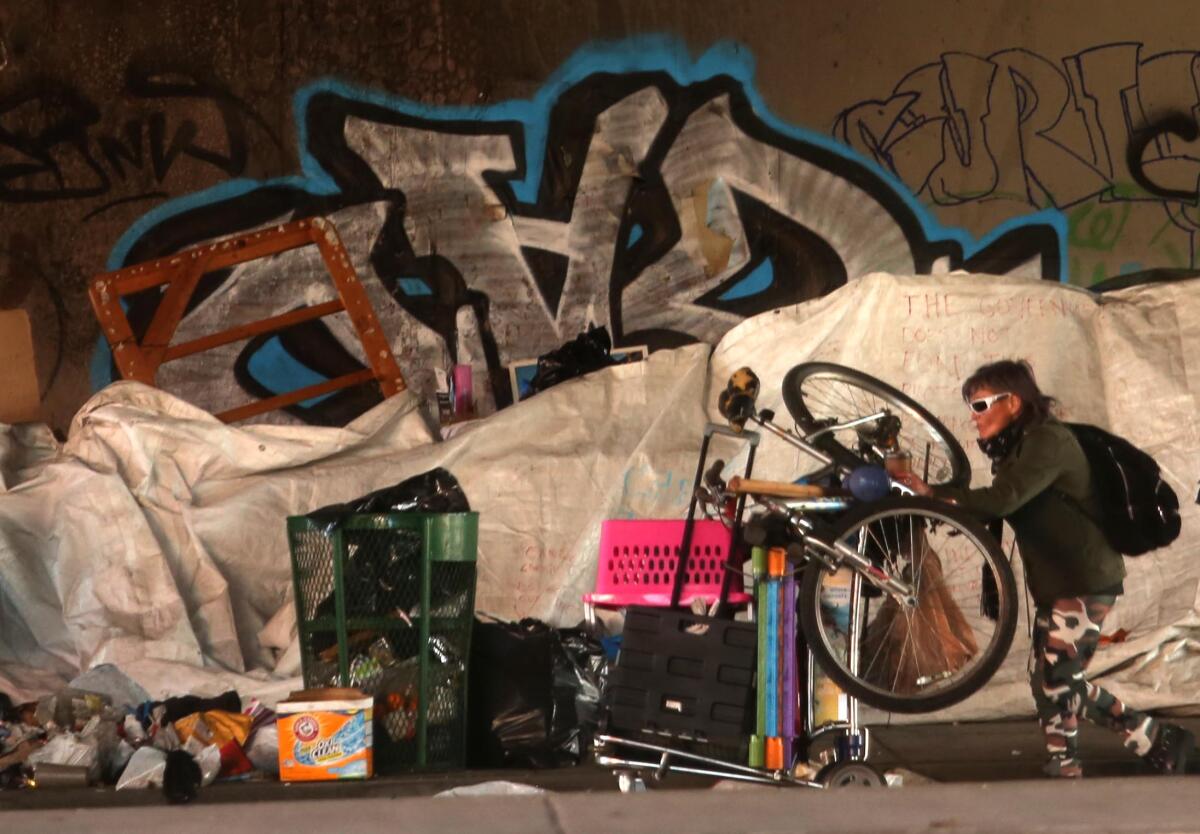
“I think a lot of hotels would still be interested because tourism hasn’t increased. So it could be a really good opportunity to get us through this year.”
The overall occupancy of Los Angeles and Long Beach hotels has increased since last spring, but it’s still at just 42%, according to STR Global, a Tennessee company that tracks hotel data. During the same week last year, hotels were at 77% occupancy.
Activists and lawyers who work with homeless people want elected officials to take an even more aggressive approach to fill unoccupied rooms. For months, they have urged Los Angeles Mayor Eric Garcetti to use his power to commandeer empty rooms and lease them for homeless people.
Even though commandeering can be a potentially arduous and contentious process, they say that too many people are at risk of getting sick for the rooms to be sitting empty. Last summer the city investigated why no hotels that had received taxpayer assistance or were built on sites currently or formerly owned by the city or its former redevelopment agency participated in Project Roomkey.
L.A. County is falling behind on its goal of quickly moving 15,000 homeless people into hotel rooms amid the COVID-19 pandemic. Activists want more.
They found a host of concerns, including one downtown hotel that was worried about how participating in Project Roomkey would affect its brand.
“It seems inconceivable to me that the city would leave that money on the table, when it means leaving tens of thousands of people on the streets,” said Legal Aid Foundation of Los Angeles attorney Shayla Myers — who has long argued for commandeering hotels.
Councilwoman Nithya Raman joined Bonin in asking the city attorney Tuesday to report back on what steps need to be taken to begin commandeering hotels and motels for use as homeless housing. Raman and other council members, including homelessness committee chair Mark Ridley-Thomas, said they were open to this course of action but first wanted to see which hotels might be willing to participate voluntarily.
In an interview, Raman said she thought the city and county’s focus on hotels that have 100 or more beds, along with budgetary concerns, limited how many hotels participated.
“I think if those two concerns are taken away, we will have a lot of hotel rooms to deal with,” she said.
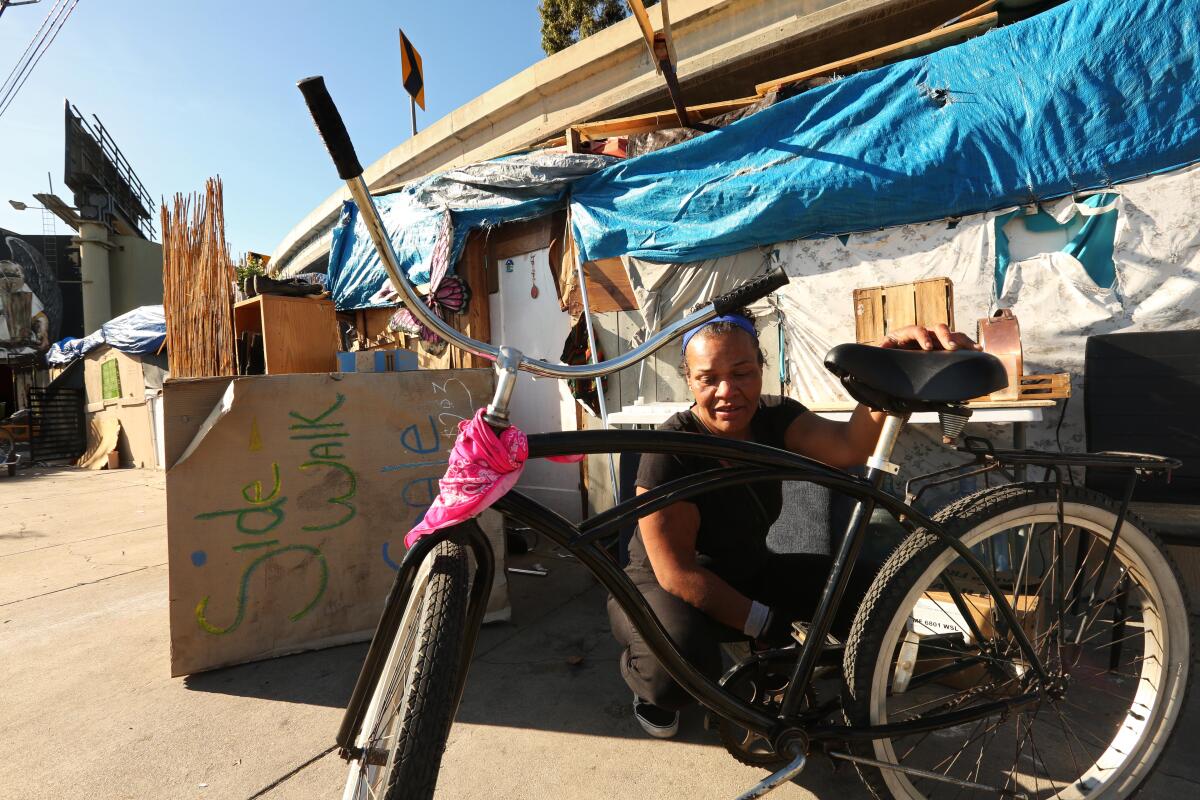
Despite the excitement, there are still a lot of unanswered questions for FEMA about the specifics of how reimbursement will work. City and county officials are working to figure out whether reimbursement is retroactive to the beginning of the pandemic.
A White House spokesman referred questions to FEMA, and a spokesman for the agency had no answers on when the 100% reimbursement went into effect.
County and city officials also want to know whether the federal government will offer money up front to rent hotels. The crippling budget crisis brought on by the pandemic has Los Angeles officials struggling to find money to front the payment for hotel rooms. Currently the federal government owes the city about $250 million for its general pandemic response, and it could take years to recoup that cash.
On homelessness, the new Biden administration is offering to spend more on the problem — but it will need buy-in from Congress.
The city of Los Angeles has committed to spending about $95 million to rent hotel rooms through the end of March, and the county has budgeted $113 million. Both have used general fund dollars along with funds they have received from the state; without new federal money, an expansion of the program could break the bank.
“It’s wonderful news,” said Garcetti at a news conference Monday. But, he added: “I want to be clear. FEMA dollars don’t come in sometimes for a year and a half or two years. So it will create a whole cash flow issue.”
Although cautioning about the challenge, Garcetti did say he’d like to see Project Roomkey expand while hotels and motels are otherwise sitting empty.
Steps from where La Cienega Boulevard runs under the 10 Freeway, Akkiya Terry stood over her bike outside a plywood structure she calls home. She moved here six months ago after a friend moved out. Homeless for seven years, Terry pines for even the smallest improvements to her living conditions, which have only worsened since the pandemic began. Still she keeps her space tidy and her clothes folded.
That ritual offers a semblance of normality. Many of her friends and her ex-husband have gotten into hotels through Project Roomkey, and she would take a bed if the opportunity arises.
“My shanty is not like a real home. I tried to make it as comfortable as if it was my bedroom,” she said. “I try to decorate it, to make it more homey for myself. It’s kind of like I’m not on the streets until I open my door.”
Times reporters Doug Smith, Kevin Rector and Rong-Gong Lin II contributed to this report.
More to Read
Sign up for Essential California
The most important California stories and recommendations in your inbox every morning.
You may occasionally receive promotional content from the Los Angeles Times.
